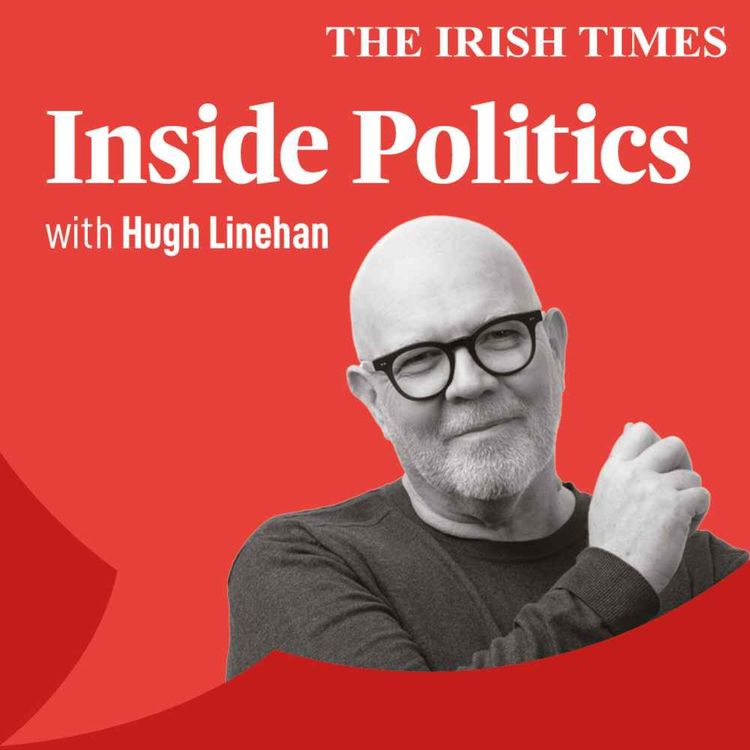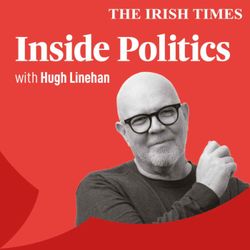Share

Inside Politics with Hugh Linehan
'Rishi Sunak can't do politics' - British broadcaster Iain Dale on why he may not vote Tory for the first time ever
•
British political pundit, broadcaster and podcaster Ian Dale joins Hugh to discuss the upcoming UK general election and the state of British politics. A Conservative supporter, Iain explains why he may not be able to vote for the party for the first time in his life.
Iain and his co-host, the former Labour Home Secretary Jacqui Smith, are bringing their politics podcast For the Many to Dublin for a live show on Sunday, March 24th. Find out more here.
Would you like to receive daily insights into world events delivered to your inbox? Sign up for Denis Staunton's Global Briefing newsletter here: irishtimes.com/newsletters/global-briefing/
More episodes
View all episodes

Is regime change in Iran a realistic possibility?
32:44|Denis Staunton, author of The Irish Times Global Briefing newsletter on international affairs, joins Hugh to talk about the escalating war in the Middle East. They talk about how Iran gradually lost its status as a regional heavyweight, America's unchecked and unrivalled military power, the shift under Trump to a strategy of decapitation when dealing with enemies, the potential economic fallout from Iran's strikes on Gulf states, potential scenarios for a post-war Iran and Europe's timid response to America's breach of international law.
'Sorry' doesn’t seem to be the hardest word for Government
53:38|Ellen Coyne and Cormac McQuinn join Hugh Linehan to look back on the week in politics:· In the Dáil on Wednesday, Taoiseach Micheál Martin issued an apology on behalf of the State to survivors of abuse in industrial and reformatory schools. Nobody doubts the sincerity of such apologies, but given the number of them over the years, perhaps their rhetoric should be matched with the practicalities and supports survivors need.· With the Residential Tenancies Bill comes into effect from March 1st, Sinn Féin finance spokesman Pearse Doherty was accused of “scaremongering and misinformation” by Tánaiste Simon Harris in the Dáil on Thursday. Doherty pointed to research carried out by I-Res Reit, the State’s largest corporate landlord, which suggested a potential increase in rent returns of up to 25 per cent resulting from the new rent rules. The new rules are designed to attract new investors into the rental property sector, and what could be more attractive than charging higher rents?· The glacial speed at which vital infrastructure projects such as the Greater Dublin Drainage Project are delivered here could be accelerated by the establishment of a new Infrastructure Regulatory Simplification Unit in Minister for Public Expenditure and Infrastructure Jack Chambers’s department.· And the upcoming byelections in Dublin Central and Galway West, with seats vacated by Paschal Donohoe and Catherine Connolly respectively, are looking increasingly hard to call.
Maria Steen: 'If you are in the centre and everybody else moves left, all of a sudden you look right wing'
01:01:32|Campaigner Maria Steen, whose failed bid to launch a run for the presidency last year put the spotlight on the nominations process, talks to Hugh and Ellen Coyne about that campaign. She talks about whether she could have won had she got that nomination and why not enough councils supported her.She also talks about Catherine Connolly's first 100 days in office, why she is uncomfortable with the labels 'conservative' and 'right wing' and whether Catholicism is a hindrance to taking part in public life.
How climate slid down this Government’s agenda
50:08|Under this coalition Government Ireland's climate ambitions are colliding with political reality. Hugh talks to Climate and Science Correspondent Caroline O'Doherty about how the current Government is retreating from its own climate legislation even as energy-hungry data centres multiply, agricultural emissions remain stubbornly high and extreme weather batters the country. From Europe's looming fines to the politics of wind farms, “herd culling” and airport expansion, they look at why Ireland is falling far short of its legally-binding 2030 targets and what that means for the future.
School SNA row teaches Government a valuable lesson
47:58|Jack Horgan-Jones and Pat Leahy join Hugh Linehan to look back on the week in politics:· The sharp criticism that greeted a review of allocation of special needs assistants in schools around the country prompted a hasty retreat by Government. The review has now been paused which should buy the Government some time to soothe tensions.· The Government are yet to act on their own voiced concerns around under-16s using social media. The problems arising from children using these platforms has been thoroughly diagnosed, but what will actually be put in place to address them?· Ireland’s only directly-elected mayor, Limerick mayor John Moran, is finding it difficult to achieve what he has set out to do in his role, and has questioned whether there is a strategy in place to “create sufficient pressure that I might simply walk away”.· The International Protection Bill is quickly working its way through the Dáil to be in place by June, in time for the EU Pact on Migration and Asylum which will take effect then.· And splashed across every front page on the planet this week was former British prince Andrew Mountbatten-Windsor who had been detained by police on suspicion of misconduct in public office.Plus, the panel picks their favourite Irish Times pieces of the week:· A revolt against Microsoft in a small German state (which Hugh fully supports), doyen of the Irish business world Michael Smurfit, and the street sweepers who keep Dhaka in Bangladesh ticking over.
Fintan O'Toole: What would fascism look like in the 2020s?
58:22|13 months in, Donald Trump's second term is proving to be a much more radical political project than his first. On today's podcast Hugh is joined by Fintan O'Toole to talk about whether the Trump administration's ideology, use of state power and rhetoric now make comparisons with the fascism of the 20th century appropriate. What would fascism look like in today’s media, institutional and geopolitical context?
Are politics students getting too narrow an education?
27:33|Disputes over freedom of speech, censorship and the shifting norms of acceptable discourse are part and parcel of modern political debate. Now the debate has come to the Leaving Cert. A review of content of the optional Politics and Society subject is underway, with the National Council for Curriculum and Assessment saying consideration will be given “to potential risks associated with including theories that may be at odds with a human rights approach”. In response, one teacher wrote to Irish Times philosophy columnist Joe Humphreys to voice concern that proposed changes will prevent students from learning about 'difficult' ideas. Joe wrote about it in his latest Unthinkable column and on today's podcast he talks to Hugh about the teaching of politics in school, the leftward skew of 'key thinkers' featured in the curriculum and how the race for CAO points means the exploration of ideas is of secondary importance to second level students.
Have Sinn Féin adopted a populist stance on Ukraine?
53:33|Jack Horgan-Jones and Harry McGee join Hugh Linehan to look back on the week in politics:· This week saw the European Parliament approve a € 90 billion package to support Ukraine in its defensive war against Russia. The loan was approved by a comfortable majority, but among those who voted against it were Sinn Féin’s two MEPs, Lynn Boylan and Kathleen Funchion. The decision to oppose the measure put them in the company of the likes of Germany’s Alternative für Deutschland, Hungary’s Fidesz and France’s Rassemblement National.· The Government has made a U-turn on the regulation of short-term lets here. After consultation with the tourism industry, Minister for Enterprise Peter Burke decided to change the previous plan to restrict such lets in towns with populations of more than 10,000 to populations of at least 20,000, this move would effectively lift the threat of regulation from potentially thousands of Airbnbs across rural towns here.· The mood was buoyant at the Social Democrat national conference in Cork with the afterglow of Catherine Connolly’s presidential election win in evidence, along with polls showing the party has begun to put daylight between itself and the Greens and Labour, who occupy the same political space. Are they about to spearhead a united left movement ahead of the next general election?· Plus, sport and politics collide ahead of the Republic of Ireland’s Nations League fixtures against Israel in the autumn. There have been calls for a boycott, but the FAI confirmed on Thursday that the matches would go ahead as planned.
Irish politics shifted left. Why?
55:57|How Ireland Voted is a regular publication featuring academic analysis of Irish elections. The latest edition looks at the 2024 general election and features an essay by Gail McElroy and Stefan Müller that puts party manifestos under the microscope, identifying which topics get the most attention and where the parties line up from left to right. The analysis suggests a major leftward shift in Irish politics over the past decade. Why has this happened, and who is filling the gap this move has left on the right of the political spectrum?Gail and Theresa Reidy, who edited the book, talk to Hugh and Pat about what the analysis tells us about Irish politics. They also talk about candidate selection practices, which is the subject of Theresa's own essay.Gail McElroy is a professor in the Department of Political Science at Trinity College, Dublin. Theresa Reidy is a professor in the Department of Government and Politics at University College Cork.